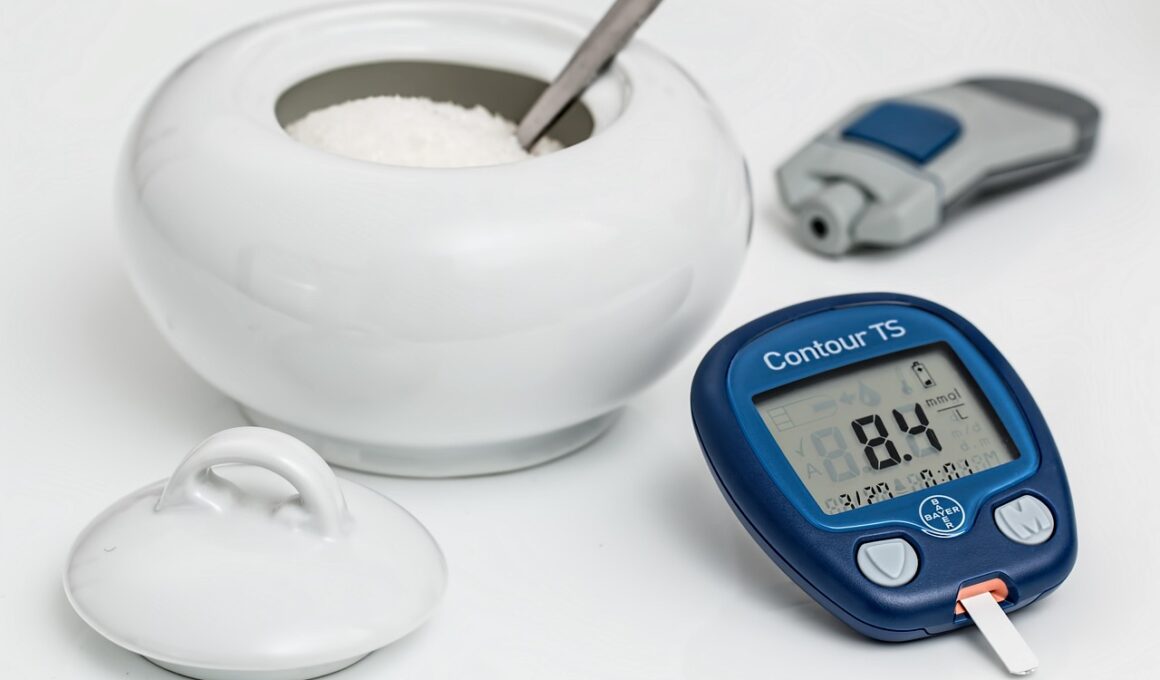Managing Insulin Resistance Through Lifestyle Choices
Insulin resistance is becoming increasingly common, affecting millions worldwide. It can lead to serious health issues like type 2 diabetes and heart disease. Therefore, managing this condition is crucial. Lifestyle choices significantly impact hormonal health. Implementing practical strategies can reinforce your body’s sensitivity to insulin. Primarily, focus on diet modifications. Choosing whole, nutrient-dense foods is essential for maintaining balanced blood sugar levels. Foods rich in fiber, healthy fats, and lean proteins help stabilize insulin responses. Including regular physical activity is another key element. Exercise improves glucose metabolism, enhancing insulin sensitivity over time. Aim for at least 150 minutes of moderate aerobic activity weekly, combined with resistance training to maximize benefits. Managing stress effectively is also critically essential, as chronic stress produces hormones that can interfere with insulin action. Mindfulness practices such as yoga, meditation, or even simple deep breathing exercises can lower stress significantly. Prioritizing sleep is another vital factor. Aim for 7–9 hours each night, as poor sleep impairs insulin function. Small adjustments in these lifestyle aspects can lead to significant improvements in insulin sensitivity, thereby enhancing your overall hormonal health.
Dietary modifications are among the most impactful steps to consider when combating insulin resistance. Start by incorporating a variety of vegetables into your meals. Choose vibrant, colorful options to maximize vitamins and minerals. Low-glycemic index foods, which release sugar slowly into the bloodstream, help to prevent insulin spikes. Examples of these include legumes, whole grains, and non-starchy vegetables like spinach and broccoli. Additionally, incorporating healthy fats, such as those found in avocados, nuts, and olive oil, can enhance your meal’s satiety and nutritional value. It’s vital to minimize processed foods, sugar, and refined carbohydrates, which can exacerbate insulin resistance. Instead of snacks like chips and cookies, turn to healthier alternatives like fruits, unsweetened yogurt, or nut-based snacks. Staying hydrated and choosing water over sugar-laden beverages also aids in metabolic health. Meal timing can further influence hormone balance; consuming well-portioned meals at regular intervals helps maintain insulin levels. Keep an eye on portion sizes, as overeating, even healthy foods, can overwhelm the body’s ability to process insulin effectively. These dietary strategies are vital in the path to better manage insulin sensitivity.
The Role of Exercise
Exercise plays a pivotal role in managing insulin resistance and enhancing overall health. Engaging in regular physical activity helps the body use glucose more efficiently. This reduces blood sugar levels and improves insulin sensitivity. Aerobic exercises, such as brisk walking, cycling, or swimming, significantly improve cardiovascular health while aiding in weight management. The American Diabetes Association recommends at least 150 minutes of moderate-intensity aerobic activity each week. Incorporating strength training twice weekly can further bolster these benefits. Strength training helps build muscle mass, which in turn enhances overall glucose uptake during metabolism. It’s effective in weight loss, as more muscle leads to increased energy expenditure, positively impacting insulin sensitivity. Additionally, short bursts of high-intensity interval training (HIIT) can be exceptionally beneficial. These workouts elevate heart rates and push the body to use stored glucose efficiently. Remember to balance exercise with adequate rest, as overtraining can stress the body, indirectly affecting hormonal health. Combining various forms of exercises can keep you engaged and ensure a well-rounded approach to improving insulin resistance. It’s about staying active, which fosters a sustainable lifestyle to manage health effectively.
Stress management is another critical component when addressing insulin resistance. High-stress levels can lead to excess hormone production, particularly cortisol. This hormone, when chronically elevated, may diminish insulin sensitivity. Therefore, finding strategies to lower stress is paramount. Regular physical activity itself is a great stress reliever and simultaneously promotes hormonal balance. In addition, mindfulness practices such as yoga, meditation, and tai chi can help calm the mind and reduce anxiety. These practices encourage present-moment awareness and greatly affect emotional well-being. Including breathing exercises or guided imagery can help manage acute stress feelings effectively. It’s equally important to establish a supportive social network. Engaging in conversations with friends or family can provide emotional support, making it easier to manage stress. Moreover, setting realistic goals and allowing time for yourself can foster a more positive mindset. Hobbies and leisure activities that bring joy can also realign your focus away from stressors. Ultimately, investing time in self-care is not just beneficial for mental health but plays a significant role in maintaining hormonal balance, thereby assisting in managing insulin resistance.
The Importance of Sleep
Sleep is a vital component of overall health and significantly impacts insulin sensitivity. Insufficient sleep can disrupt hormonal balance and lead to insulin resistance over time. Aim for 7 to 9 hours of quality sleep each night, establishing a regular sleep schedule. Creating a calming bedtime routine can signal your body it’s time to unwind. Incorporate activities such as reading, warm showers, or light stretching to promote relaxation. Additionally, make your sleep environment conducive to rest. Ensure your bedroom is dark, quiet, and cool to facilitate uninterrupted sleep. Limiting screen time before bed is crucial too, as blue light emitted from devices can interfere with melatonin production. Avoid excessive caffeine intake in the afternoon or evening to help your body feel naturally fatigued at bedtime. Managing stress and anxiety levels also plays a role in sleep quality; incorporate techniques discussed earlier such as deep breathing or meditation into your evening routine. It’s essential to catch up on sleep if you miss it during the week, as sleep debt can lead to chronic health issues. Prioritizing sleep can have a transformative effect on insulin sensitivity and overall hormonal health.
Hydration plays a subtle yet essential role in managing insulin resistance. Staying well-hydrated helps to optimize metabolic processes within the body, including the regulation of blood sugar levels. Water intake is vital for overall bodily functions, from digestion to nutrient absorption. Aim for at least 8-10 cups of water daily, adjusting for activity levels or climate conditions. Sometimes, thirst can confuse our body’s signals for hunger; maintaining hydration may help reduce unnecessary snacking. Herbal teas or infused water can be pleasant alternatives to plain water, making hydration enjoyable. Additionally, pay attention to alcoholic beverages, as excessive consumption can lead to dehydration and negatively affect hormone regulation. Soft drinks and sugary beverages should be limited due to their high calorie and sugar content, which may cause fluctuations in insulin levels. Remember older adults or individuals with specific health conditions may require adjustments in their fluid intake. Recognizing the importance of hydration is essential for maintaining optimal insulin sensitivity. This easy lifestyle change can further support your commitment to better hormonal health and overall well-being.
Consistency and Commitment
Implementing these lifestyle changes requires consistency and commitment. It’s essential for individuals facing insulin resistance to understand that progress takes time and patience. Setting achievable goals in the diet, exercise, stress management, and sleep routines can lead to sustainable change. Small, incremental adjustments are often more effective than drastic shifts. Keep a journal or utilize apps to track your daily choices, making it easier to identify patterns and potential improvements over time. Surrounding yourself with supportive individuals on a similar journey can reinforce motivation and accountability. Participating in group activities or online forums focused on lifestyle changes can help maintain inspiration. Consider seeking professional guidance from nutritionists or fitness trainers who specialize in hormonal health. They can provide tailored advice that suits your personal circumstances. Finding enjoyment in these new habits fosters intrinsic motivation, making it easier to stick with them over the long run. Celebrate your achievements, no matter how small; they matter and accumulate toward better health. By staying committed to these lifestyle choices, you’re laying the foundation for improved insulin sensitivity and a happier, healthier you.
In conclusion, managing insulin resistance is achievable through a series of lifestyle choices that promote hormonal health. By focusing on dietary adjustments, regular exercise, effective stress management, and adequate sleep, you can significantly enhance insulin sensitivity over time. Hydration should not be overlooked, as it directly supports metabolic processes. A consistent approach and commitment to these changes are crucial for long-term success. Each choice plays a critical role in shaping your body’s response to insulin, influencing overall health. Make gradual changes, setting realistic goals, and track your progress to stay motivated. Surrounding yourself with encouraging individuals can also provide necessary support along the way. Finally, don’t hesitate to seek expert guidance when needed; it’s a positive step toward achieving your health objectives. Your journey to better hormonal health may be challenging, but the rewards are compelling—a healthier, more vibrant life awaits. Reflecting on and adjusting your lifestyle will bring profound benefits for years to come.


